What's Happening?
The European Union has introduced the European Military Mobility Enhanced Response System (EMERS) to improve the rapid movement of troops and military equipment across the continent in response to potential threats from Russia. This system allows member
countries to temporarily suspend normal transport rules during emergencies, granting military priority access to infrastructure and essential services. The initiative aims to address existing barriers in military mobility, such as divergent national rules and lengthy advance notice requirements for military equipment transit. The EU and NATO are working to streamline the movement of troops, weapons, ammunition, and fuel from Western Europe to Eastern front lines, enhancing their ability to deter adversaries effectively.
Why It's Important?
The implementation of EMERS is crucial for strengthening the EU's defense capabilities against potential Russian aggression. By improving military mobility, the EU can respond more swiftly to threats, reducing the risk of delayed military operations. This initiative also highlights the importance of collaboration between EU member states and NATO in maintaining regional security. The ability to move military assets quickly and efficiently is vital for deterring adversaries and ensuring the readiness of forces in the event of a conflict. The system's focus on harmonizing transport rules and prioritizing military access to infrastructure is a significant step towards enhancing the EU's strategic defense posture.
What's Next?
The EU plans to conduct reviews of existing transport regulations, including the Rail Service Facilities Regulation and the Air Services Regulation, to further improve military mobility. Additionally, the creation of a strategic lift reserve and a solidarity pool for shared use of transport assets during crises is anticipated. These measures will support the EU's efforts to enhance its defense capabilities and ensure rapid military response in emergencies. The ongoing collaboration with NATO will likely continue to play a key role in the development and implementation of these initiatives.














